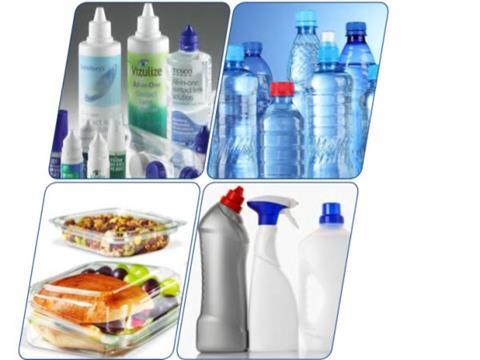
Plastic containers are available in the most diverse designs, shapes, and materials and can be used in a wide variety of applications.
“These products of daily life are the result of continuous research and optimization; the requirements are constantly increasing,” Ceresana’s CEO Oliver Kutsch explains.
The market research institute has analyzed the European market for rigid plastic containers. In many applications, plastics replace other materials such as glass or metal: Ceresana forecasts the European sales of plastic containers to reach a volume of more than 12.4 million tonnes in 2024.
PET Discovers New Areas of ApplicationPET packaging already reached high market shares in the segments CSD (carbonated soft drinks) and packaged water. Now, PET bottles and other containers also enter other segments, such as food, fruit juices, and household chemicals (e.g. detergents). Their positive properties are the reason for that: They weigh comparatively little, are recyclable, do not break, and offer high clarity. The gas barrier properties and protection against UV radiation continue to improve. Especially in the segment food, PET containers are a growth market. Thus, Ceresana’s analysts expect demand for PET in this segment, for example, in Poland to rise by an impressive 4.6 % per year.
State Regulations Change the MarketTime and again, new laws and regulations bring about changes for the market. For manufacturers and dealers, it is crucial to make decisions at an early stage and to quantify their consequences. An example are the new regulations for PET bottles for alcoholic beverages in Russia.
Convenience and SustainabilityBesides overall state regulations and economic development, the market for plastic containers is subject to a range of further influences. The beverage market in particular, including the packaging structure, income development, and social trends, must be taken into account. Urbanization and demographic change are accompanied with changing consumption patterns. In some segments, plastics are replacing traditional materials. At the same time, rigid plastic containers also face an increasing competition by bags and other flexible plastic packaging solutions. Other trends such as convenience, rising number of women in employment, sustainability or light weighting also influence the market and require an intensive examination of the market mechanisms.
The Study in Brief:Chapter 1 analyzes demand, production, import, and export as well as revenues in regard to plastic containers for 27 countries. Further, the study analyzes the demand for containers made of various types of plastics within the individual areas of application (e.g. PET containers in the segment food).
Chapter 2 offers a detailed analysis of various application areas of plastic containers: Data on consumption trends for lemonades, water, juices, other beverages, household chemicals, cosmetics & pharmaceuticals, food, and industry & transport.
Chapter 3 analyzes the demand for containers split by the types of plastic PET, PP, HDPE, LDPE & LLDPE, PS & EPS, PVC, and other plastics.Chapter 4 provides company profiles of major manufacturers of plastic containers – clearly arranged according to contact details, revenues, profit, product range, production sites, and profile summary. In-depth profiles of 82 producers are given, including Amcor Limited, Ball Corporation, Berry Global, DS Smith Plc, Papier-Mettler KG, Reynolds Group Holdings Limited, Sealed Air Corporation, Inc., Sonoco Products Company, and Bemis Company, Inc.













